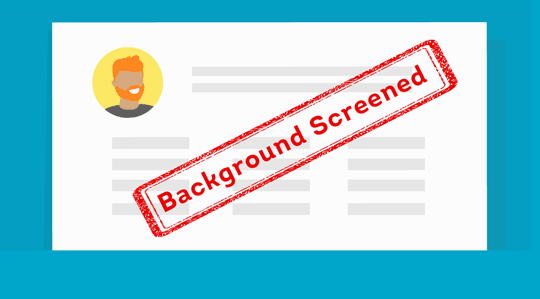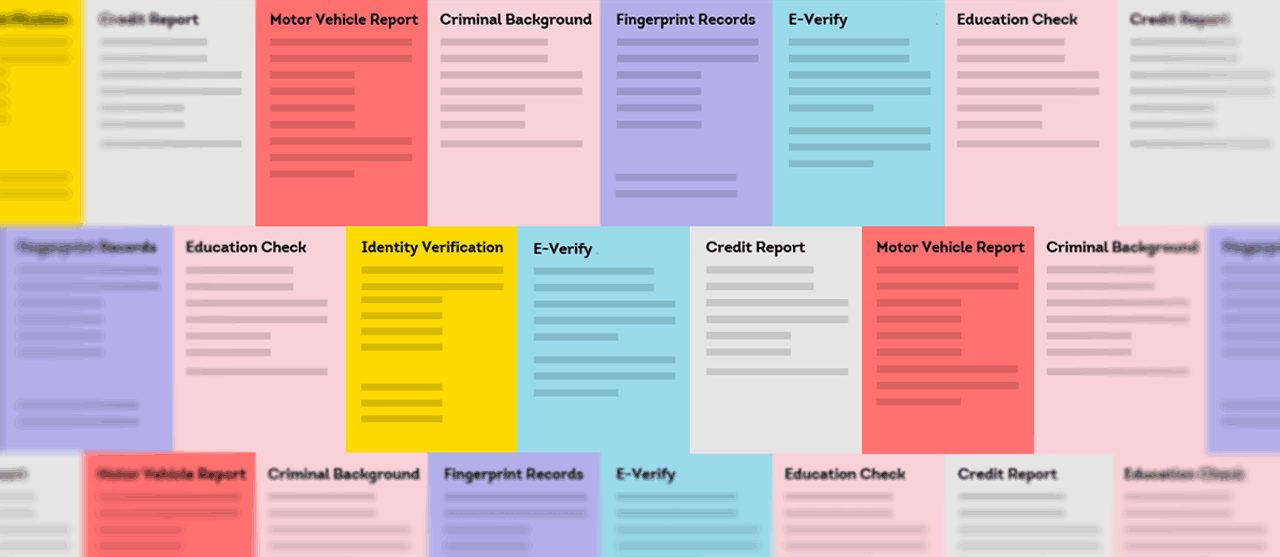No employer wants to make a bad hire. The cost of a bad hire adds up quickly when you consider:
- Time spent hiring and onboarding
- Time spent on performance management
- Company reputation risk
- Potential risk to coworkers and customers
- Turnover costs
Luckily for employers, the risk of a bad hire can be reduced with a thorough hiring and screening process. With different background check options, how do you choose the right one for your business? It depends on the information you need and how much time and money you’re willing to spend. Keep reading to learn how to do employee background checks before you make your next hire.
What Background Checks Show
Pre-employment screening is an essential tool for businesses of all sizes. Screening helps you make better-informed hiring decisions that can protect your company, your employees, your customers, and your reputation, and learning how to do a background check is one of the most important strategies for your business. So what exactly should a background check show? It depends on the position.
When it comes to the safety of your employees and customers, criminal and sex offender records should be inspected where appropriate. If the candidate in question will have access to confidential information, a felony record check could be a priority. When learning how to do background checks on employees, it’s critical to know the employment laws surrounding the position.
While prior employment and education verification can be completed without a background check service, many small businesses don’t have direct access to credit-based tools. Pre-employment screening services can indicate a job candidate’s fiscal responsibility, trustworthiness, criminal past and more.
As you learn how to do a background check, you’ll encounter three different screening solutions: traditional background checks, online DIY background checks, and pre-employment screening services.

1) Traditional Background Check Company
Traditional employment background check companies are designed to offer several screening options. A traditional background check company may provide information about the following:
- Misdemeanor and felony criminal records
- Sex offender status
- Social Security Number validation
- Employment verification
- Education verification
- License verification
- Credit reports
- Motor vehicle records
- Military records
- Address history
While these types of checks are thorough, they can also be time consuming and costly. Using a traditional background check company could mean waiting anywhere from days to weeks for results. In the meantime, your open position will remain vacant, potentially resulting in significant losses in productivity and profit. You will also often spend more for the additional research and interviews that can be required in these types of checks.
Traditional Background Check Companies May Not Be the Best Fit for a Small Business
For many small business owners, traditional background check services provide more information than necessary. For example, it might be imperative to check the driving records of any potential delivery driver, but it might not be appropriate to run a credit check for employment on a 16-year-old, part-time cashier.
While it’s important to get a comprehensive view of your candidate, these checks may require spending time and money on additional reports, research, and details that may not be necessary. As a result, you may pay too much for information you don’t need, and be forced to wait too long—in the meantime, you may lose out on a stellar candidate.

One of the most time-consuming checks that may be performed in this type of screening is a manual county-level criminal record search. This type of search requires a person to physically visit a courthouse to check county-level criminal records and can take as long as 30 days to return results. In most cases, an instant criminal search is cheaper, quicker, and generally comprehensive enough to meet the screening needs of a small business.
Bottom Line: Traditional background checks can provide a thorough look at a job candidate’s history. However, these services can be time consuming, costly, and provide more information than necessary for a small business.
2) Online People Search Databases
Some employers opt to take the DIY approach for learning how to do background checks on employees and use free online people search databases to retrieve background information on their applicants. This option may be convenient and free, but may not be reliable enough for hiring decisions.
Depending on the site, you may receive information including:
- Sexual assault offenses
- History of bankruptcies
- Judgments
- Address history
- Marriage records
It’s difficult to verify if the information provided on these websites is correct. Basing your hiring decision on inaccurate or inconclusive information can result in a bad hire that causes more trouble down the road.
Bottom Line: While online background check websites may be convenient, their information may not be reliable enough for hiring decisions, and it’s best to learn other methods for how to do a background check.
3) Online Employment Screening Services
One of the quickest methods and easiest ways to run a reliable background check through an online employment screening service like TransUnion ShareAble for Hires. ShareAble for Hires allows you to check comprehensive credit and criminal reports within minutes and verify your applicant’s identity so you know they are who they say they are.
Information is pulled from a variety of sources to create a comprehensive view of a candidate’s background. The ShareAble for Hires database contains nearly 300 million national and state criminal records, Most Wanted databases, and the Sex Offender Public Registry. You get access within minutes to information potentially including:
- Credit reports from TransUnion, a trusted credit reporting agency
- Identity verification
- Felony and misdemeanor records for 43 states*
- Records from the FBI, Homeland Security, and DEA
- National Sex Offender Public Registry records
Accuracy is imperative when screening candidates, but it can be tricky if your candidate has a common name. ShareAble for Hires’ advanced record matching capabilities increase correct matches and reduce inaccurate records.

Bottom Line: Online screening services like ShareAble for Hires give you fast and affordable access to essential background information that helps protect your business.
How to do a Background Check: The Do’s and Don’ts
When screening a potential new hire, there are certain processes you’ll want to follow to ensure you’re getting the best quality candidate. Below is an overview of the do’s and don’ts to keep in mind during screening.
Do’s:
Do be consistent with background check policies.
If you have multiple departments in your business which require different screening criteria, consider dividing jobs into different categories and developing position-specific, standardized searches. For example, entry level employees might be subjected to a basic background check, whereas those capable of making financial decisions should additionally be given a credit check.
It’s wise to have your pre-employment screening process documented in case any issues arise in the future.
Do be thorough.
When it comes to learning how to do a background check, simply calling past employers or professional references is not enough. You may never know if the professional reference they listed is actually a friend or roommate.
Even if a past employer corroborates their role in an organization, they might not know about a previous criminal record. Social media is also an unreliable outlet and not a comprehensive source of information, so go beyond searching for your candidate online.
Be expansive in your search for information and don’t just look for one single item. Simply because someone’s address is verified does not mean that their past is free of criminal history. In addition to checking for any criminal reports, remember to verify their employment history and education as well.
Do follow local laws governing the use of background checks for employment.
Hiring managers must be sensitive to the local, state, and federal laws regarding employment decisions. When making personnel decisions—including hiring, retention, promotion, and reassignment—it’s natural for most employers to be curious about their applicants’ backgrounds.
However, any time you make an employment decision based on a person’s background information, you must comply with federal laws enforced by the Equal Employment Opportunity Commission (EEOC), and similar state and local laws.
Following the law is one of the most important tips to remember as you learn how to run employment background checks. Don’t forget to check your state or municipal’s laws as well, as some states have additional rules and regulations for conducting pre-employment background checks.
Do understand the difference between consumer reports and reference checks.
A consumer report can contain information from a variety of sources and databases such as credit reports, criminal record searches, and employment verifications.
These are very different from a reference check or “reference interview”. Reference interviews dig deeper than data-entry material and can help uncover information such as unexplained gaps in employment and reveal any inaccuracies reported on a resume.

By checking and interviewing references, you can assess the applicant’s work history and capabilities. However, it’s important to remain compliant with privacy and equal opportunity laws.
Don'ts
Don't ask about a candidate’s character when checking employment references.
While conducting references checks can be used to help protect your business against the wrong hire, it’s important to be objective with your questions.
Do not ask a former employer about an applicant’s character or anything that could be rendered subjective;. There are still fact-based questions you can ask which can lend you better insight into their demeanor in the workplace.
For example: What was the individual’s role at your organization, and what was your relationship to them? How would you describe the individual’s work standards? Would this individual be eligible for rehire?
Don't change your background check policies on a candidate-by-candidate basis.
Make sure you universally apply your pre-employment screening policy across all roles of your organization, categorized by their title or job position.
Don’t only look for negatives.
When learning how to do background checks for employment, it’s important to remember to review a host of different information. Companies can lose out on great employees by focusing on only one item instead of evaluating a number of sources. Background checks are inherently used as a means of gathering negative information to protect against bad hires, but try to locate positive attributes as well. Seek for positive patterns of behavior as a defensible method for hiring decisions, as one good or mad act should not define a person’s character or work ethic. Looking for positives as well as negatives can help you better decide between two candidates.
Don’t forget to communicate.
Even if your candidate doesn’t formally protest a pre-adverse action notice, you should give them the opportunity to explain any misconceptions or mistakes. Engaging in a face-to-face conversation can resolve many potential reporting errors, and some people who might have made a single bad mistake in their past may still deserve and opportunity to redeem themselves. Always communicate and use your best judgment.
Don’t use “the box”
Our final tip on what not to do as you learn how to do pre-employment background checks, is to not use “the box”. The question on job applications which ask if the candidate has ever been convicted of a crime can be considered immediate discrimination, and the EEOC along with several states have attempted to ban the box altogether. Avoid the question so you can consider all applicants equally, and then run a broad and consistent background check afterwards.
Conclusion
There are several pre-employment screening services to consider, but small business owners stand to benefit from a convenient, reliable, online screening service such as ShareAble for Hires. ShareAble for Hires delivers fast, reliable, and comprehensive results with credit and criminal reports and identity verification. You get results in minutes so you have the data you need to make a well-informed decision fast.
*Instant criminal results not available for Delaware, Hawaii, Kentucky, Massachusetts, South Dakota, Utah, Washington DC, and Wyoming.







